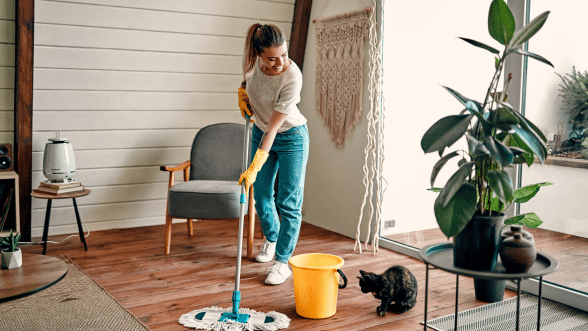
Manage cleaning with Adhd, is possible during Spring.
There’s nothing quite like accomplishing a full cleaning project. Whether it’s seeing the floor of a previously cluttered closet, removing excess dust from high shelves, or clearing clutter from high-traffic areas, a clean home can go a long way for your mental health. However, accomplishing large projects like a spring cleaning can seem like impossible tasks when you have ADHD.
Executive functioning helps the mind plan out large tasks, separate them into manageable pieces, and stay on target — all of which are elements that could be difficult if you have ADHD. Read on to learn about some common challenges and how to plan and accomplish your spring cleaning goals to overcome these challenges.
6 Tips for Spring Cleaning With ADHD
1. Divide and Conquer
When you look around at a messy room or home, it can quickly feel overwhelming. There are many tasks that will go into making it clean, such as laundry, vacuuming, dusting, etc. To help avoid this, take stock of what needs to be done and then break it into smaller tasks.
Section cleaning into specific areas for each day, such as getting the left half of the living room cleaned today and the right cleaned tomorrow, for example. Gather laundry one day and wash, fold, and put it away the next day.
2. Create a Routine
One way to tackle a large cleaning project while staying ahead of future tasks is to create a routine. This could include assigning certain chores to certain days, creating a habit of always placing clothes in a hamper before going to sleep, or ensuring that all dishes are put in the sink after dinner. Creating small habits — and sticking to them — can lead to a sustainable routine that grows over time.
Creating a cleaning checklist can also be helpful for yourself. Simply mark off tasks once they’re done and reward yourself afterwards. If you mark off a large chunk in a day, for example, watch an episode of your favorite show or have a hot chocolate to celebrate small victories.
3. Organize Cleverly
Organizing can be difficult, and staying organized long-term can be even harder. Instead of forcing organized spaces, allow some areas to get a little chaotic when it makes sense to do so. For example, if you have one closet that always feels cluttered, then make that your clutter closet and put items you don’t use often in there.
When organizing drawers, cabinets, or pantries, label each area so that you’re aware of the items inside. This reduces shuffling through items and cluttering them along the way.
4. Donate When Possible
Clutter happens when you have more items than you actually use. Many of those items may be useful for someone else, so keep a donation box in your garage or basement. Throughout the year, add items that you no longer need.
In addition to a donation box, try to declutter and make donations one to two times a year. Spring and fall tend to be good times to donate because you may be going through the closet for summer or winter clothes in advance of those seasons. Having less clutter means less need to organize and clean in the long run.
5. Don’t Blame Yourself
Having a home that feels unclean to you can bring out negative internal emotions. Understanding that feeling and overcoming it are vital steps toward achieving the goals you have for your home.
Adults with ADHD may get hyper-focused on negative feelings about their home’s appearance. Try to refocus that energy into understanding what aspects you can control. For example, if you feel comfortable only having guests in your living room, draw a boundary that all other rooms are off limits for the time being.
6. Share the Responsibility
Whether you live with a roommate, family, or a partner, it’s essential that everyone contributes to keeping the home clean. You can make a game of it, such as seeing who can fill out their cleaning checklist first, or ensure that you have a celebration (such as a nice dinner) after certain big cleaning goals have been accomplished.




